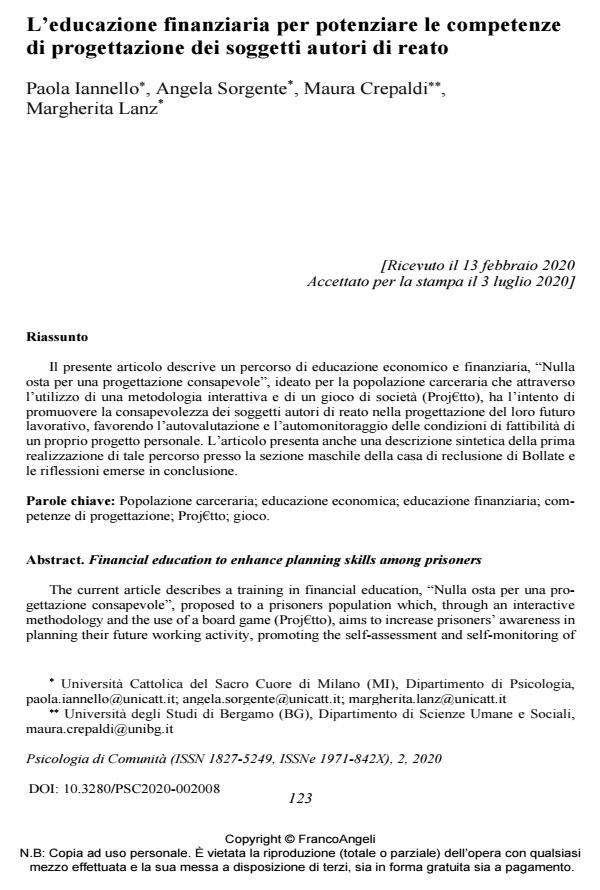L’educazione finanziaria per potenziare le competenze di progettazione dei soggetti autori di reato
Titolo Rivista PSICOLOGIA DI COMUNITA’
Autori/Curatori Paola Iannello, Angela Sorgente, Maura Crepaldi, Margherita Lanz
Anno di pubblicazione 2020 Fascicolo 2020/2
Lingua Italiano Numero pagine 21 P. 123-143 Dimensione file 591 KB
DOI 10.3280/PSC2020-002008
Il DOI è il codice a barre della proprietà intellettuale: per saperne di più
clicca qui
Qui sotto puoi vedere in anteprima la prima pagina di questo articolo.
Se questo articolo ti interessa, lo puoi acquistare (e scaricare in formato pdf) seguendo le facili indicazioni per acquistare il download credit. Acquista Download Credits per scaricare questo Articolo in formato PDF

FrancoAngeli è membro della Publishers International Linking Association, Inc (PILA), associazione indipendente e non profit per facilitare (attraverso i servizi tecnologici implementati da CrossRef.org) l’accesso degli studiosi ai contenuti digitali nelle pubblicazioni professionali e scientifiche.
Il presente articolo descrive un percorso di educazione economico e finanziaria, "Nulla osta per una progettazione consapevole", ideato per la popolazione carceraria che attraverso l’utilizzo di una metodologia interattiva e di un gioco di società (Projetto), ha l’intento di pro-muovere la consapevolezza dei soggetti autori di reato nella progettazione del loro futuro lavorativo, favorendo l’autovalutazione e l’automonitoraggio delle condizioni di fattibilità di un proprio progetto personale. L’articolo presenta anche una descrizione sintetica della prima rea-lizzazione di tale percorso presso la sezione maschile della casa di reclusione di Bollate e le ri-flessioni emerse in conclusione.
Parole chiave:Popolazione carceraria; educazione economica; educazione finanziaria; compe-tenze di progettazione; Projetto; gioco.
- L'educazione finanziaria per potenziare le competenze di progettazione dei soggetti autori di reato Paola Iannello, Angela Sorgente, Maura Crepaldi, Margherita Lanz, in PSICOLOGIA DI COMUNITA' 2/2020 pp.123
DOI: 10.3280/PSC2020-002008
Paola Iannello, Angela Sorgente, Maura Crepaldi, Margherita Lanz, L’educazione finanziaria per potenziare le competenze di progettazione dei soggetti autori di reato in "PSICOLOGIA DI COMUNITA’" 2/2020, pp 123-143, DOI: 10.3280/PSC2020-002008